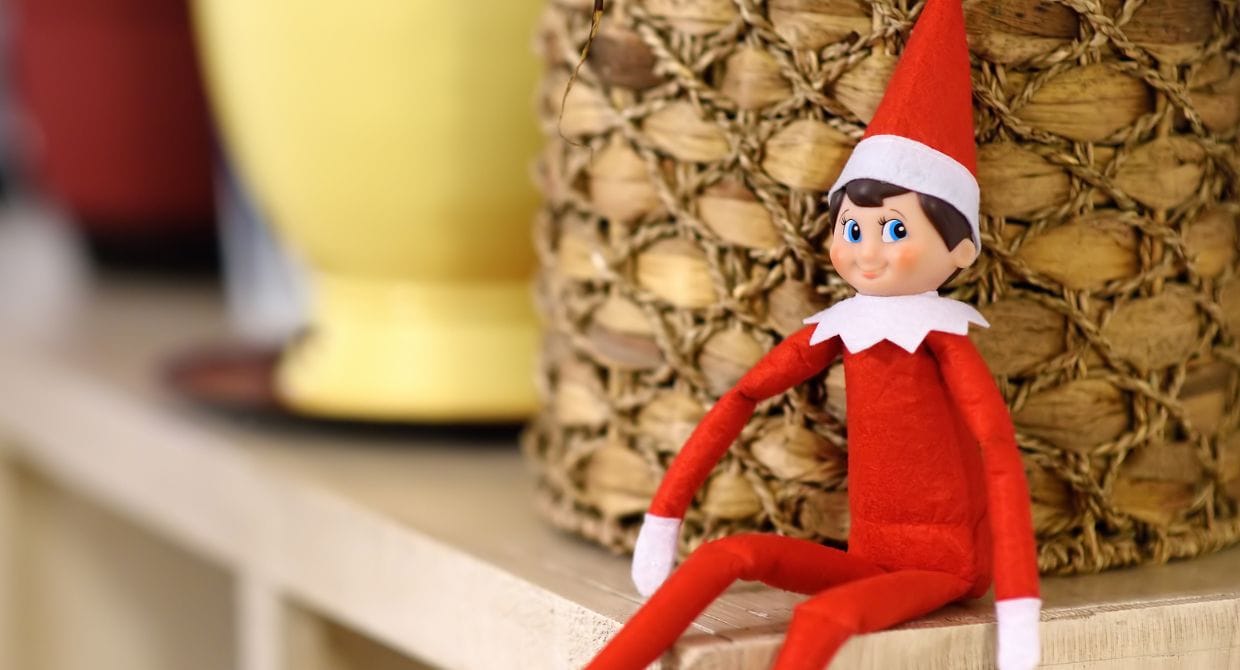Elf on the Shelf: Does it Really Improve Kids’ Behavior?

Each holiday season, many of us hype up the endearing magic of jolly old St. Nick, his busy, benevolent elves, and his bottomless bag of toys. We adore seeing the wonder and anticipation in our children’s eyes as we paint the scene of Santa’s soon-to-be visit. We dream of our kids’ holidays being nothing less than the merriest and the brightest.
A mere moment later, we turn the tables and use the same holiday magic for chiding, warnings, and bribes.
“If you want presents this year, Jackson, you need to stop whining!”
“You’d better follow the rules, Maddie–Santa’s always watching and listening!”
It’s understandable. After all, all we want for Christmas is the magic of well-behaved kids.
Many of us enlist help from an Elf on the Shelf to remind our kids that he’s keeping tabs and monitoring their place on the infamous naughty or nice list. We explain he’ll report back to Santa every night regarding their behavior.
Sure, the Elf returns to a new spot each morning, often doing funny, silly things. But for many families, he’s partially there to warn children that a lack of good behavior leads to a lack of presents.
Knowing that Santa’s Elf is constantly watching over them can create discouragement and anxiety for kids–especially for those who struggle with impulse control or who have difficulty making good choices. Most kids’ brains and bodies fire long before considering what the Elf may be reporting to Santa.
And let’s be honest–would we really withhold that new scooter or train set on Christmas morning because the Elf spied our daughter sweeping cookie crumbs under the rug?
Instead of an Elf that manipulates our kids with the lure of presents and unsettles them with a judgmental eye, why not use our little elf “helper” solely as entertainment and holiday fun?
Here’s how to really encourage good behavior; not just around the holidays, but all year long.
Ditch the Rewards–All of Them
Will your teenager shovel the driveway if you promise him money? Very likely. Will your young daughter smile for Santa if you promise her a candy cane? Quite possibly. Will your kids eat asparagus with the reward of your mother-in-law’s infamously dry fruitcake? Well, that might be a no.
The truth is, we give our kids presents and rewards for everything these days. Why? Because the promise of rewards is a quick and easy way to get kids to comply.
The same goes for the promise of presents during the holiday season. The holidays can be an extremely busy and stressful time of year for parents and kids alike. We may notice that our kids are misbehaving just as much as, if not more than, usual.
After all, ’tis the season for the same old whining, tantrums, and disobedience.
As a result, many of us turn to bribes. With presents in the near future, it seems like an opportune time to hold them over our kids’ heads. But what happens when the holidays are over and Elf on the Shelf gets packed away in the attic?
At Positive Parenting Solutions, we teach that short-term rewards fail to instill long-term motivation. We can’t maintain rewards throughout a child’s entire life for every good deed they accomplish.
We can’t afford it, foremost, but even if we could, it doesn’t teach kids that good behavior has better benefits–like success in school, helping others, and self-respect.
Instead, rewards make good behavior seem like a chore and, eventually, lead to entitlement.
This doesn’t mean we aren’t going to buy our kids presents for the holidays or that Santa won’t be swinging by our house. Nor does it mean we can’t make a funny little elf do silly things on our mantle. But it does mean we shouldn’t dangle rewards like a carrot in exchange for our children’s cooperation.
The When-Then Tool
One of my favorite tools to share with parents is the When-Then tool, which is a reliable way to encourage good behavior.
If we use When-Then, we don’t need to constantly demand, nag, or employ an observing elf to get our kids to accomplish less-than-desirable tasks.
If we want our kids to clean up in preparation for Grandma and Grandpa’s annual visit, we can simply say, “When you’ve cleaned up your room, Maddie, then you can play with your LEGOS” or, “When you’ve finished folding your laundry, Zach, then you can go to your friend’s house.”
When-Then works like a charm because it gives our kids more control and avoids power struggles. They can decide when they complete the task–which subsequently determines when they can enjoy their privilege.
Even if it’s begrudgingly at first, they start taking on more responsibility. Because at this point, it isn’t us standing in their way–or a spying elf–it’s only them.
One big caveat: When-Then needs to be used with already established privileges, like a kid’s usual TV time or after-school activities. Otherwise, the “then” will just be perceived as another reward.
Focus On Effective Consequences
If we want our kids to follow our rules, then we need to apply effective consequences.
Consequences that are unfair or unrelated to misbehavior will only aggravate our children.
If your 11-year-old stays up too late watching Home Alone and tells you the next morning she’s too tired to play in her hockey game, expect her to meet her obligations by going to the game and experiencing the natural consequences of her previous night’s actions. She’ll likely endure game-losing fatigue, feel remorseful about her choice, and learn to never stay up late before a game again.
Bringing Elf on the Shelf into the mix, though, (or in any way reminding her that her presents may be withheld in exchange for her late-night viewing) would seem unfair.
Fair consequences are effective consequences. And nine times out of ten, consequences aren’t even necessary. If we get to the root of the misbehavior, we can avoid them altogether.
Give Kids Your Attention
One of the biggest motivators for misbehavior is actually a lack of attention.
It may or may not be surprising, but to a kid, even negative attention is better than no attention at all.
Imagine, especially during the holidays, how easy it can be to give our kids less of our time and focus. The holidays are about spending time with family, but the reality is much more chaotic.
Because of this, our children may be feeling less significant in our lives (and more inclined to catch our glances by any means necessary).
Kids don’t care what time of year it is, or how many presents we have to buy, wrap, and ship off to relatives. They are oblivious to the holiday work parties and potlucks we’re scheduled to attend. They may not realize how involved we are behind the scenes for their school parties, holiday programs, and teacher holiday gifts.
They just want to spend some time with us this holiday season–and sadly, that can be really hard to do.
No matter what your seasonal stressors are, the best way to make this time of year–well, any time of year–really valuable and misbehavior-free is to focus on one-on-one quality time with your kids.
I always recommend daily, uninterrupted time together for a minimum of 10-20 minutes, doing something your child chooses.
This is one of the most effective ways to battle common misbehaviors.
Take Time for Training
Kids may be innocent, but we know all too well they aren’t born with perfect skills or behavior.
If your 4-year-old is having full-on meltdowns every time she struggles to buckle her snow boots (ahem…because she’s already wearing gloves), it’s better not to get testy, yell, or remind her that the Elf is watching.
A better solution is the Take Time for Training tool.
Your daughter doesn’t need to be bribed to stop complaining, nor should she be worried that Santa won’t deliver the My Little Pony she requested. She just needs you to take time to show her, perhaps more than once, that she should buckle her boots before putting on her gloves.
It may mean we have to completely stop what we’re doing and calmly show our kids the process. It could be as simple as showing our daughter how to get dressed or demonstrating to our exasperated, and LATE, teenage son how to free up his car’s frozen windshield wipers. Taking the time for training solves common frustrations and keeps them from recurring.
It’s so simple to think that we just need to spend a few minutes teaching our children what they don’t naturally know how to do. Yet it’s easily overlooked when we’re tired, frustrated, and busy (like all year round).
Final Thoughts
I realize that Elf on the Shelf is largely for fun and can brighten up any December morning with hilarious antics–unless you stayed up too late on Pinterest feverishly researching how to one-up your previous night’s elf display and now need extra coffee.
But my advice? If we want to focus on better behavior this holiday season, let Elf on the Shelf stick to the jokes. (He’s more of a born comedian, anyway.)
All it will really take for a great holiday and beyond with your kids is just a little positive parenting magic.
For more of our Positive Parenting “magic,” please join me for a FREE online class. You’ll be introduced to some basic positive parenting ideas that can really make a difference this holiday season–and beyond.
What You Should Do Next:
1. Subscribe to my Newsletter:
Sign up for my newsletter for parenting tips to help you create a happier home and become the parent you always wanted to be. Plus, when you subscribe, I'll also send you a copy of our strategy-packed guide 10 Tips for Better Behavior – Starting NOW!
2. Register for my FREE 60-Minute Class:
Register for my free class called How to Get Kids to Listen, Without Nagging, Yelling or Losing Control. Classes run several times per week to accommodate your busy schedule.
3. Enroll in my 7-Step Parenting Success System® Course
Enroll now in my proven 7-step system for busy parents ready for change (it's rated 5 stars on Google). Plus, for a limited time, save $100 on all plans—completely risk-free and with lifetime access.
About the Author





